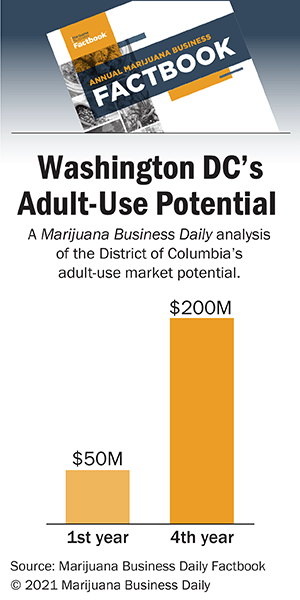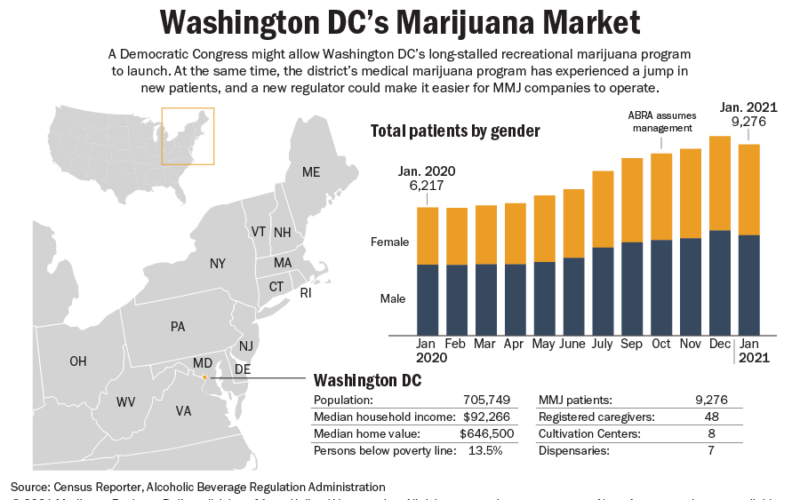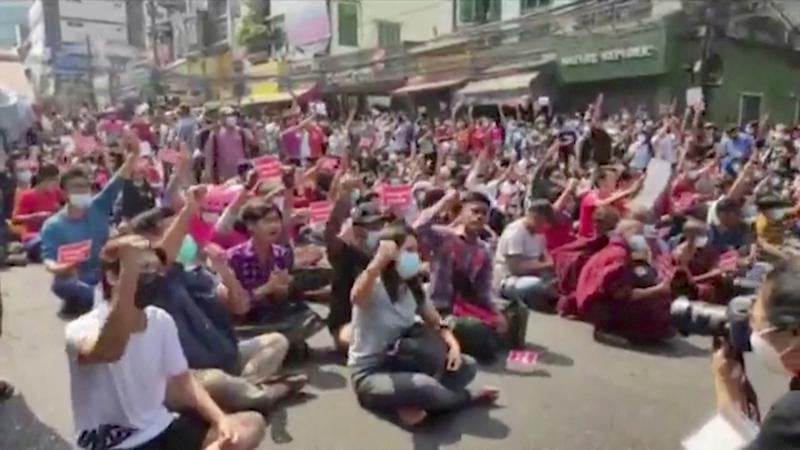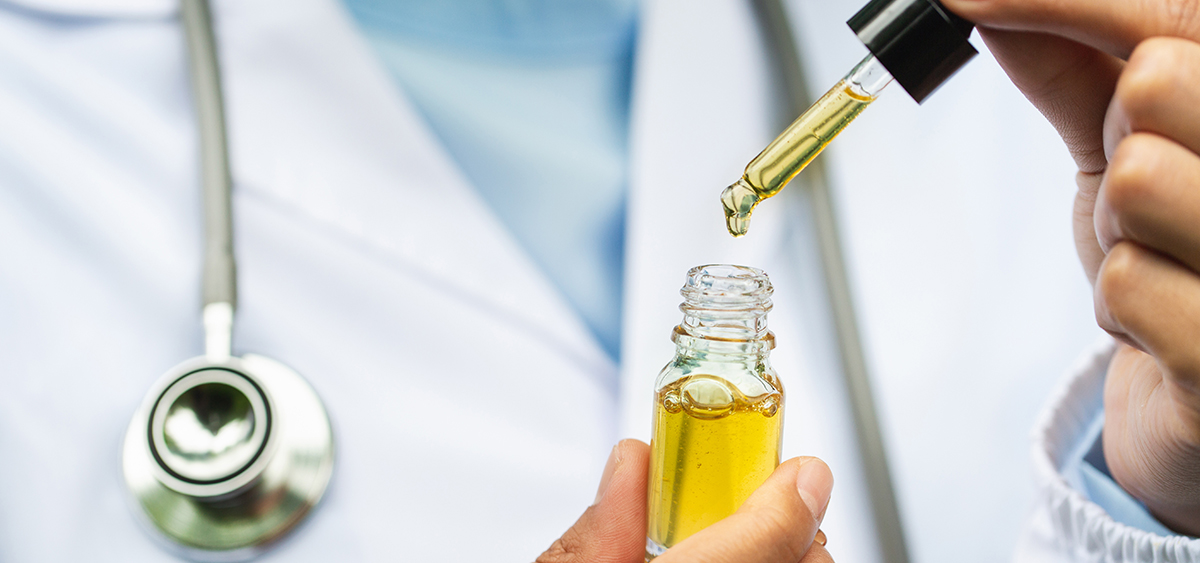Washington DC’s long-stalled recreational cannabis market could get a new lease on life now that Democrats control both chambers of Congress, a development that could generate more than $200 million in annual sales for local marijuana retailers in a few years.
At the same time, the District’s existing medical cannabis companies have gotten a shot in the arm now that a new regulatory agency oversees the industry.
The new regulator – the District’s Alcoholic Beverage Regulatory Agency (ABRA) – has taken steps to boost medical marijuana patient counts and make it easier for companies to operate.
The ABRA also would likely play a key part in rolling out a new recreational program.
Voters approved recreational cannabis seven years ago, but Congressional Republicans blocked the program’s launch.
With Democrats now in control of Congress, recreational sales could begin in roughly one year, one local industry executive predicted.
“I think it’s very possible that we could see sales by the end of 2021,” said Adam Goers, vice president of corporate affairs at Columbia Care, a New York-based multistate operator with a cultivation site in the District, plus a dispensary that operates as Capital City Care.
“The worst case is that we’re seeing it sometime in early 2022.”
Republicans block program
Washington DC voters passed a recreational marijuana legalization referendum in 2014, one year after the launch of the District’s medical program.
That was the same year Republicans took control of both chambers of Congress.

With their firm grip on Congress, Republicans used an arcane federal law to attach a rider to the federal budget bill prohibiting the District from using tax dollars to set up a recreational marketplace.
Congress has passed such a rider every year since 2015, including most recently on Dec. 27, 2020.
Now that Democrats control Congress, Washington DC cannabis industry executives say it’s a matter of when, not if, lawmakers will jettison the rider.
“I think our chances are much better, because the majority of the members of Congress truly support cannabis,” said Linda Mercado Greene, founder and owner of Anacostia Organics, a District dispensary.
Congress could undo the rider soon, even within a month or two, observers said.
Alternatively, Congress could let the rider lapse when the budget bill expires at the end of the year, paving the way for the launch of the recreational program.
Marijuana Business Daily projects the launch of a recreational marketplace could generate $50 million in retail sales the first year and more than $200 million the fourth year.
Business operators say it would be possible to begin the program quickly because of the existing medical marketplace.
Also, the ABRA is reported to have been working on developing recreational regulations.
“It’s not as though the mayor and the City Council haven’t been looking at this issue. DC has a pretty good framework already on how to open up sales quickly,” Goers said. “I think that 90% of the work has been done.”
“We’re preparing for it,” Greene said. “The legal licensees are working closely with ABRA.”
Calls and emails to Washington DC Mayor Muriel Bowser’s office were not returned.
A spokesperson for the ABRA said the agency could have announcements to make about the recreational program later this month.
Streamlining MMJ regulations
Meanwhile, Washington DC’s medical marijuana program has experienced a surge in patient numbers over the past year.
That increase come comes amid a change in regulators, with the ABRA replacing the District’s health department last October.
The District’s patient count has increased to almost 9,300 from 6,200 in January 2020.
The biggest factor, executives said, was a DC Health decision in February 2020 to temporarily eliminate MMJ card expirations. The extension has been periodically renewed, with the most recent one going until the beginning of May.
That eliminated the need for patients to renew cards, an inconvenience that kept many from staying in the program.
“It’s like a funnel where patients are consistently dropping out the bottom and our job is to consistently kind of push them back into the top of that funnel,” said Chanda Macias, owner and general manager of the National Holistic Healing Center.
“That bottom that they’ve been falling out of has been closed off.”
In response to the COVID-19 pandemic, DC Health also allowed home deliveries and allowed patients to obtain their medical marijuana cards online.
Despite these positive efforts, District MMJ operators said the health department lacked adequate staffing and its mission meant the agency was less likely to help the industry.
“I think that the mayor’s office, as well as broad stakeholders, recognize that the department of health was not well situated to oversee this,” Goers said.
Industry bullish on regulator
Industry executives welcomed the arrival of the ABRA.
“They are responsive. They stay in touch with us. They have calls with us all the time. They’re very engaging,” Greene said.
Washington DC operators also said the agency has implemented a number of changes that should help the industry to expand. Among other steps, the ABRA:
- Created temporary employment cards to make it easier for marijuana businesses to hire and start new employees at work while they await their permanent employment registrations.
- Sped up approval of MMJ patient cards to two or three days versus 30 days or more under DC Health. Upon being approved, patients are sent a link where they can print out temporary cards as PDFs before receiving physical cards in the mail.
- Allowed dispensaries to serve MMJ cardholders from a growing number of states and territories with legal medical markets. Local dispensaries now serve around 3,000 patients from 32 markets outside the District, including more than 2,000 from neighboring Maryland and a growing number from Virginia.
- Raised the number of vehicles a dispensary could use for delivery from one to three and expanded the window for home delivery by four hours to 9 a.m. to 9 p.m.
The Marijuana Business Factbook projects that MMJ sales via dispensaries in 2021 will total $17 million to $21 million, up from an estimated $16 million to $19 million last year.
Looking ahead, Washington DC still has two cultivation licenses left to award, given that eight of the 10 cultivation licenses allotted under the District’s medical program have been issued.
Neither of Washington DC’s two testing-lab licenses have been awarded, either.
All seven dispensary licenses allotted under the program have also been awarded.
The changes and new opportunities have local cannabis industry executives feeling optimistic about the future, including the possible rollout of an adult-use program.
“We feel like things are headed in that direction,” Macias said.
Omar Sacirbey can be reached at [email protected]
Medical Disclaimer:
The information provided in these blog posts is intended for general informational and educational purposes only. It is not a substitute for professional medical advice, diagnosis, or treatment. Always seek the advice of your physician or other qualified healthcare provider with any questions you may have regarding a medical condition. The use of any information provided in these blog posts is solely at your own risk. The authors and the website do not recommend or endorse any specific products, treatments, or procedures mentioned. Reliance on any information in these blog posts is solely at your own discretion.







